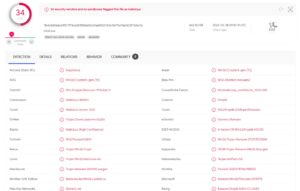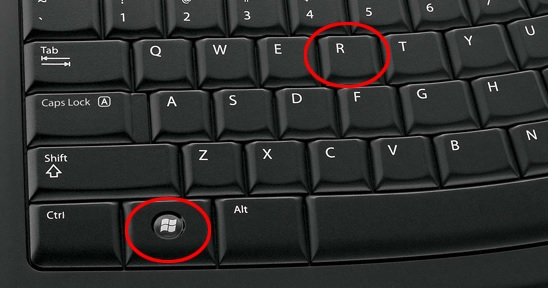Please, have in mind that SpyHunter offers a free 7-day Trial version with full functionality. Credit card is required, no charge upfront.
| Virus Name | Fgui |
| Infection symptoms | All images, videos and documents append “.fgui” extension and cannot be opened by any program! |
| Type of threat | Ransomware, cryptovirus, file-locking virus |
| File Extension | .fgui |
| Encryption type | RSA 2048 + Salsa20 |
| Ransom Note | _readme.txt |
| Amount of Ransom | $980 ($490 – 50% discount for payment within 72 hours) |
| Contact | support@sysmail.ch, helprestoremanager@airmail.cc |
| Genealogy | DJVU Ransomware |
| Aliases | Ransom:Win32/Filecoder.GF!MTB; HEUR:Trojan-Ransom.Win32.Stop.gen; Win.Dropper.Raccoon-9916366-0;A Variant Of Win32/Kryptik.HOOD
more detections VirusTotal |
| Distribution | Spam email attachments, RDP, pirated software, torrent websites, phishing sites |
| Remediation Tool |
In order to completely remove ransomware from your computer, you will need to install an antivirus software. We recommend using SpyHunter |
| Recovery Tool |
The only effective method to restore files is to copy them from a saved backup. If you don’t have a suitable backup, you may use third-party recover software such as iBeesoft Data Recovery |
How to Remove .Fgui File Extension Ransomware?
Fgui ransomware is a virus that encrypts your files and demands money to unencrypt them. Once encrypted, files are rendered inaccessible. It is one of many new DJVU ransomware varieties. Like many malicious programs, Fgui ransomware may enter your computer when you download and install free software and the installer of that free program contains the virus. Research has shown that Fgui ransomware might also use Windows built-in capabilities to block the entire user interface of your system, making it impossible to access any program or files on your computer. If you’re infected by Fgui ransomware, we recommend using our guide to decrypt or recover .Fgui files.

The message of the ransom note can state this:
ATTENTION! Don’t worry, you can return all your files! All your files like pictures, databases, documents and other important are encrypted with strongest encryption and unique key. The only method of recovering files is to purchase decrypt tool and unique key for you. This software will decrypt all your encrypted files. What guarantees you have? You can send one of your encrypted file from your PC and we decrypt it for free. But we can decrypt only 1 file for free. File must not contain valuable information. You can get and look video overview decrypt tool: https://we.tl/t-bPgv29RUmq Price of private key and decrypt software is $980. Discount 50% available if you contact us first 72 hours, that’s price for you is $490. Please note that you’ll never restore your data without payment. Check your e-mail “Spam” or “Junk” folder if you don’t get answer more than 6 hours. To get this software you need write on our e-mail: support@sysmail.ch Reserve e-mail address to contact us: helprestoremanager@airmail.cc
How did I get infected with?
The .Fgui ransomware virus is distributed via spam or malicious web pages. It is also spread through malicious email attachments. The virus can travel inside of file-sharing networks and P2P clients. There are many ways that a victim can be infected by this new virus, but the most prominent one is via fake email attachments containing false files with DOC, XLS, and other bogus extensions. These types of emails are regularly sent to millions of users from all over the globe. The cumbersome thing about this virus is that it can start encrypting files when the victim accesses their PC. This is because the ransomware infection is trojanized and installed as a startup process, so that every time the victim turns on their computer, they’re forced to wait while their machine reboots and displays multiple fake warning messages. The virus then scans the files that are available on your machine and encrypts them.
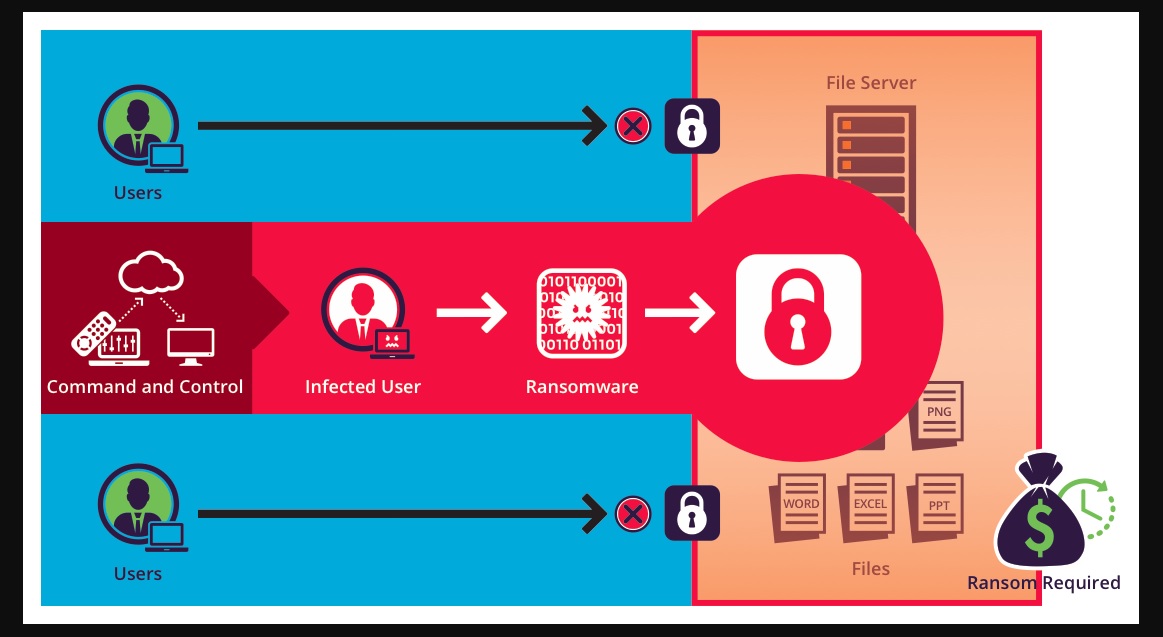
Why is .Fgui File Extension dangerous?
Ransomware is particularly dangerous for two reasons:
- First, it encrypts your data and locks them away behind strong password protection.
- Second, the hackers behind ransomware may not unlock your files even after you pay the ransom.
Since Fgui ransomware is designed to encrypt your files only, it is not very difficult to eliminate it without having to pay a ransom. The “encryption” of particular files is just the modification of their names and the addition of an extension; therefore, if you rename those files the RaaS will no longer encrypt them. Your computer will not be able to access those encrypted files even after the removal of Fgui ransomware. For this reason, it is recommended that you back up your files using a backup program before the infection. The encrypted files refused access by the RaaS can be moved to a new directory and given non-encrypted names or simply deleted if there are no other copies elsewhere on your device. The safest thing you can do is remove Fgui ransomware from your computer.
Do not pay for Fgui ransom!
Please, try to use the available backups, or Decrypter tools
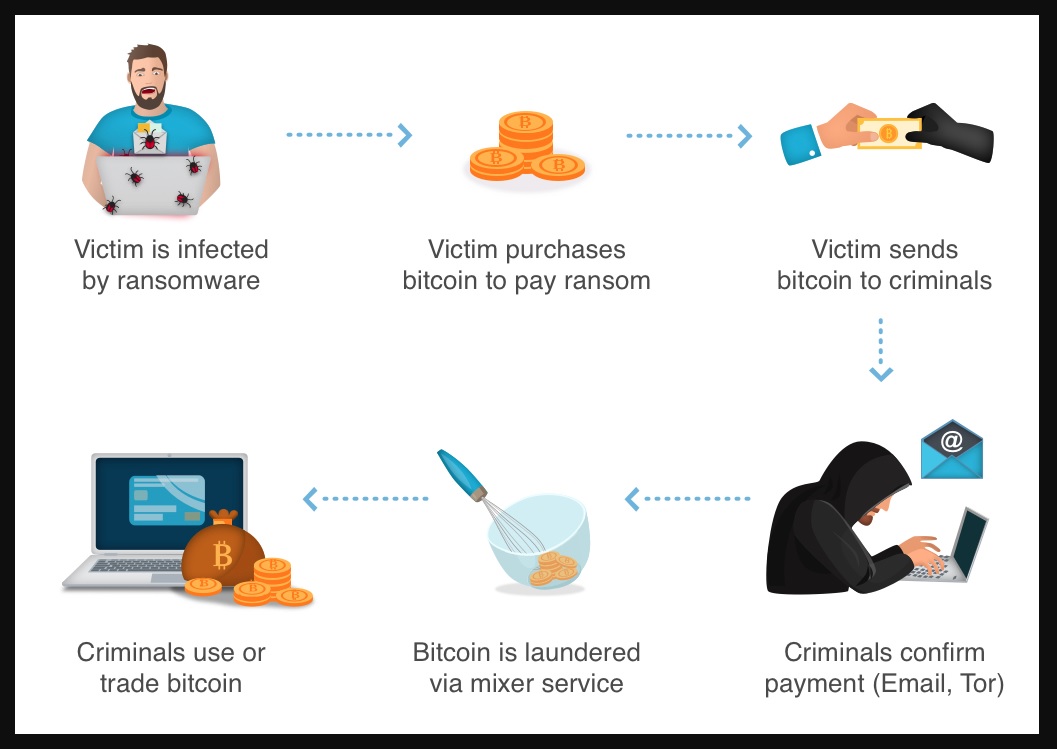
.Fgui File Extension Removal Instructions
Please, have in mind that SpyHunter offers a free 7-day Trial version with full functionality. Credit card is required, no charge upfront.
STEP 1: Kill the Malicious Process
STEP 3: Locate Startup Location
STEP 4: Recover .Fgui File Extension Encrypted Files
STEP 1: Stop the malicious process using Windows Task Manager
- Open your task Manager by pressing CTRL+SHIFT+ESC keys simultaneously
- Locate the process of the ransomware. Have in mind that this is usually a random generated file.
- Before you kill the process, type the name on a text document for later reference.
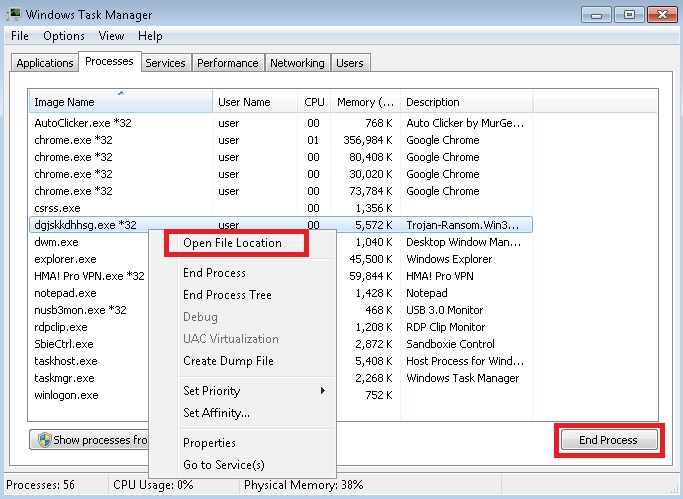
- Locate any suspicious processes associated with .Fgui File Extension encryption Virus.
- Right click on the process
- Open File Location
- End Process
- Delete the directories with the suspicious files.
- Have in mind that the process can be hiding and very difficult to detect
STEP 2: Reveal Hidden Files
- Open any folder
- Click on “Organize” button
- Choose “Folder and Search Options”
- Select the “View” tab
- Select “Show hidden files and folders” option
- Uncheck “Hide protected operating system files”
- Click “Apply” and “OK” button
STEP 3: Locate .Fgui File Extension encryption Virus startup location
- Once the operating system loads press simultaneously the Windows Logo Button and the R key.
- A dialog box should open. Type “Regedit”
- WARNING! be very careful when editing the Microsoft Windows Registry as this may render the system broken.
Depending on your OS (x86 or x64) navigate to:
[HKEY_CURRENT_USER\Software\Microsoft\Windows\CurrentVersion\Run] or
[HKEY_LOCAL_MACHINE\SOFTWARE\Microsoft\Windows\CurrentVersion\Run] or
[HKEY_LOCAL_MACHINE\SOFTWARE\Wow6432Node\Microsoft\Windows\CurrentVersion\Run]
- and delete the display Name: [RANDOM]
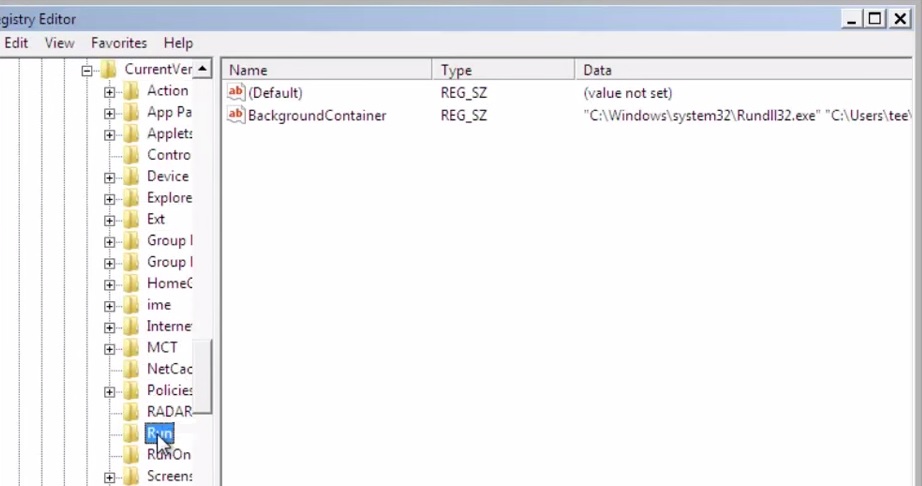
- Then open your explorer and navigate to:
Navigate to your %appdata% folder and delete the executable.
You can alternatively use your msconfig windows program to double check the execution point of the virus. Please, have in mind that the names in your machine might be different as they might be generated randomly, that’s why you should run any professional scanner to identify malicious files.
Do NOT send money for decrypt of “Fgui” files!
The cyber criminals behind Fgui ransomware guarantee to send you the code after you pay. However, all you’ve got is a promise from bad people. You have no warranty whatsoever. We recommend not to rely on words of internet criminals. If you pay this will continue to happen.

STEP 4: How to recover encrypted files?
- Method 1: The first and best method is to restore your data from a recent backup, in case that you have one.
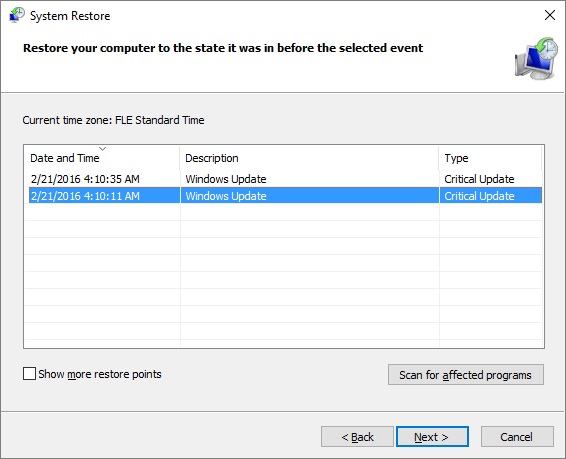
- Method 2: File Recovery Software – Usually when the ransomware encrypts a file it first makes a copy of it, encrypts the copy, and then deletes the original. Due to this you may try to use file recovery software like iBeesoft Data Recovery to try recover some of your original files.
- Method 3: Shadow Volume Copies – As a last resort, you can try to restore your files via Shadow Volume Copies. Open the Shadow Explorer part of the package and choose the Drive you want to recover. Right click on any file you want to restore and click Export on it.
- Wait for Antivirus companies to create an Fgui file decryptor.

